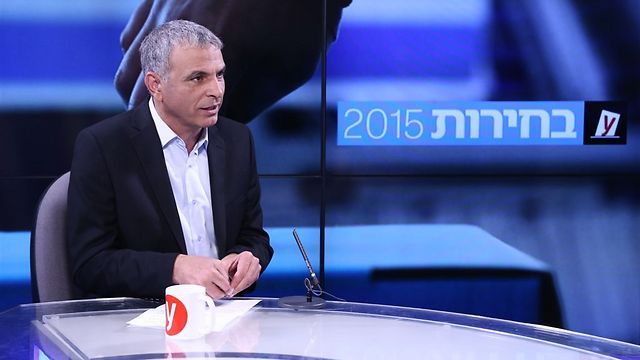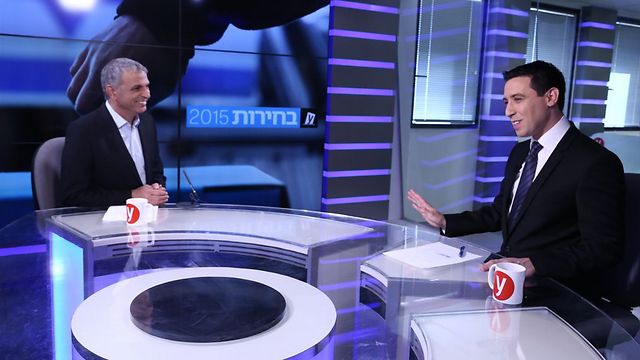
Kahlon rejects Netanyahu's Finance Ministry portfolio offer, citing lack of trust
In attempt to consolidate center-right coalition, Netanyahu offers top economic spot to Kahlon, who rejects offer, saying Netanyahu had made such promises in the past but failed to keep his word.
Prime Minister Benjamin Netanyahu, trailing in opinion polls two days before a parliamentary election, publicly offered on Sunday the Finance Ministry portfolio to a potentially king-making rival Moshe Kahlon, who rebuffed the proposal, saying he did not trust Netanyahu to keep his word.
Netanyahu made the offer in an attempt to force Kahlon to commit to supporting Netanyahu in the coalition-building process, but Kahlon refused to commit, hedging his bets ahead of Tuesday elections.
“Netanyahu had already promised me the Israel Lands Administration and the Finance Ministry in the past, but did not keep (his word),” Kahlon said in response to an interview given by Netanyahu in which he said offered Kahlon the finance portfolio.
“It's not person, but a manner of policy, and concern for the average man. The public is tired of promises. (The offer) is flattering, but it does not solve the desperate problems of Israeli society,” he added.
Facing possible upset defeat in the March 17 vote, Netanyahu has launched a media blitz to counter what appears to be a rising tide of support for his main opponent, the centre-left Zionist Union.
Kahlon, a former member of Netanyahu's Likud party whose newly formed centrist party could be a deciding factor in who becomes prime minister, dismissed the offer as pre-election spin. The latest opinion polls predict the Zionist Union taking between 24 and 26 seats in the election, compared with 20-22 seats for Likud.
But even if Likud is outnumbered, Netanyahu is counting on a larger right-wing block to support his bid for another term, and Kahlon, with around 10 seats in the polls, could tilt things in his favor.
"If I am the one to put together the government, he (Kahlon) will be part of the coalition. Without regard of the number of seats (he wins), he will get the finance portfolio," Netanyahu said on Israel Radio.
A former communications minister, Kahlon delighted Israelis by promoting competition in the cellular market, a move that slashed the prices of mobile telephone services. He broke ranks with Likud after social protests in 2011 and opted to sit out the 2013 election, later forming the Kulanu party and now making a run for the Finance Ministry.
Though a natural partner for Netanyahu, he is being wooed by both sides and has not ruled out joining a coalition led by Isaac Herzog of the Zionist Union.
Speaking to Ynet, Kahlon said that the public – and not Netanyahu - should select him as finance minister, giving him a mandate instead of a "political appointment."
"We're 48 hours before the election, there was no doubt such spin would come," Kahlon told Israel Radio regarding Netanyahu's offer. "I didn't ask for the finance portfolio from Herzog or from Netanyahu. I asked for the finance portfolio only from the public."
Beyond promising to speed up economic reforms that will lower living costs, Netanyahu has kept the focus for the most part on security issues.
Over social media and broadcast interviews, the three-term leader has accused unspecified foreign governments and tycoons of funneling tens of millions of dollars to opposition activists working to undermine him and boost the Zionist Union joint list, led by Herzog and Tzipi Livni.
They, in turn, have dismissed this as a bid by Netanyahu to shift voters' attention from socio-economic problems to security challenges such as the Palestinian statehood drive and Iran's nuclear diplomacy, on which the prime minister argues that he alone can resist pressure from abroad.
Attila Somfalvi and Reuters cotnributed to this report













